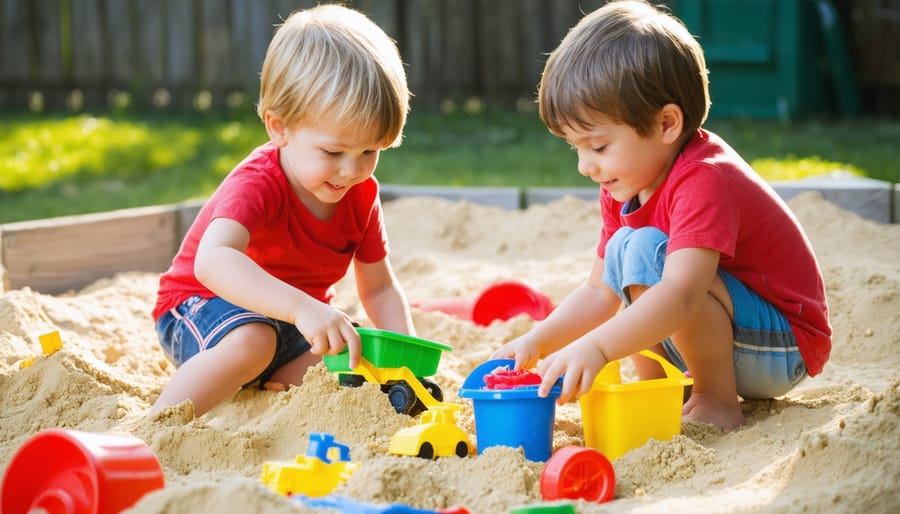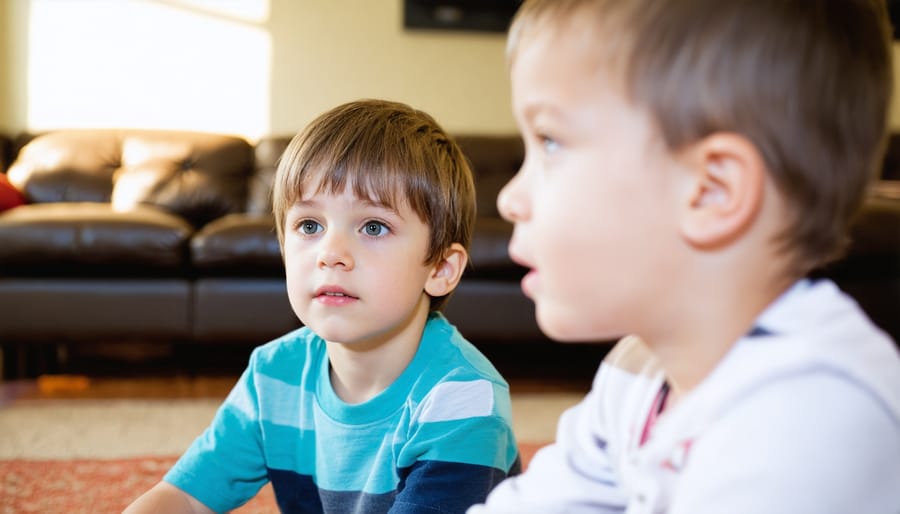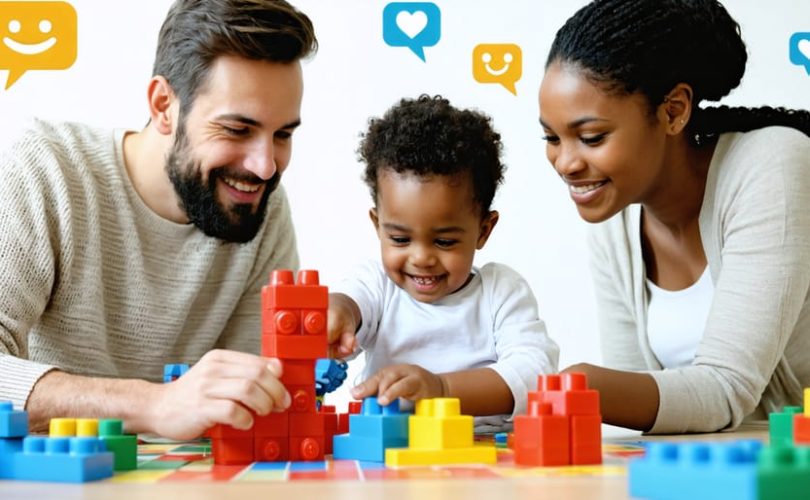Social skills shape every aspect of a child’s life, from making friends on the playground to succeeding in future careers. While some children naturally gravitate toward social interactions, others need extra support to develop these crucial life skills – and that’s perfectly normal. As parents and caregivers, we play a vital role in nurturing these abilities through everyday interactions and intentional guidance.
Understanding social skill development isn’t just about teaching children to share or say “please” and “thank you.” It’s about helping them recognize emotional cues, navigate complex relationships, and build lasting connections with others. Research shows that children with strong social skills are more likely to succeed academically, maintain healthy relationships, and experience better mental health outcomes throughout their lives.
Whether your child is naturally outgoing or tends to be more reserved, every child can develop strong social capabilities with the right support and practice. This journey looks different for each family, but the fundamental building blocks remain the same: creating safe opportunities for social interaction, modeling positive behavior, and providing gentle guidance when challenges arise.
In this guide, we’ll explore practical, evidence-based strategies to help your child build these essential life skills, while respecting their unique personality and developmental timeline.
Key Milestones in Children’s Social Development
Ages 2-5: Early Social Connections
During ages 2-5, children begin their exciting journey of social discovery. This period marks significant milestones in how little ones interact with others and understand social cues. Through engaging activities for preschoolers, children learn fundamental skills like sharing, taking turns, and expressing emotions.
At this stage, children typically progress from parallel play (playing alongside others) to cooperative play, where they actively engage with peers. They begin to understand basic emotions in others and develop empathy, though they may still struggle with impulse control and sharing.
Parents can support this development by creating opportunities for supervised playdates, modeling positive social behaviors, and praising kind interactions. Simple activities like pretend play, group storytimes, and supervised sharing exercises help build these crucial skills.
Remember that each child develops at their own pace. While some might eagerly join group activities, others may need more time to warm up to social situations. The key is providing gentle encouragement while respecting your child’s natural temperament and comfort level.

Ages 6-12: Building Complex Social Skills
During the elementary school years, children face increasingly complex social situations that help shape their interpersonal abilities. This period marks significant growth in understanding social nuances, developing empathy, and building lasting friendships.
Children at this age begin to grasp subtle social cues and learn to navigate group dynamics. They develop the ability to see situations from others’ perspectives, manage conflicts independently, and understand the importance of cooperation. School activities, team sports, and group projects provide valuable opportunities to practice these skills.
Parents can support this development by encouraging positive interactions and helping children process social challenges. Role-playing difficult situations, discussing emotions openly, and practicing problem-solving strategies can build confidence in social settings. It’s also important to help children understand the impact of their words and actions on others.
Common milestones during this period include:
– Forming close friendships based on shared interests
– Understanding and following social rules
– Developing better emotional regulation
– Learning to compromise and negotiate
– Showing increased empathy and concern for others
– Participating effectively in group activities
Remember that each child develops at their own pace, and gentle guidance combined with patience helps foster healthy social growth.
Essential Social Skills Your Child Needs
Communication and Active Listening
Communication is the foundation of meaningful social connections, and children develop these skills through a fascinating journey of learning and practice. From their earliest interactions, children begin to understand that their words, gestures, and expressions have power in connecting with others.
Active listening plays a crucial role in this development. When children learn to truly listen – not just hear – they begin to understand others’ perspectives and emotions. This skill goes beyond simply waiting for their turn to speak; it involves paying attention to facial expressions, tone of voice, and body language.
Parents can nurture these skills by modeling good communication habits. When you give your child your full attention during conversations, maintain eye contact, and respond thoughtfully to their words, you’re teaching valuable lessons about respectful dialogue. Simple practices like asking open-ended questions about their day or encouraging them to share their feelings help build these abilities naturally.
Remember that every child develops at their own pace. Some may be naturally chatty, while others take more time to open up. The key is creating safe, judgment-free spaces for practice. During family meals, playdates, or even casual conversations, encourage your child to both express themselves and listen to others.
Role-playing exercises can be particularly effective. Acting out different scenarios helps children practice both speaking clearly and listening actively, preparing them for real-world social interactions.

Empathy and Emotional Intelligence
Understanding and responding to others’ feelings is a cornerstone of healthy social development. Children who develop strong emotional intelligence and empathy are better equipped to build lasting friendships, resolve conflicts, and master their emotions in challenging situations.
Dr. Sarah Chen, a child psychologist, shares: “Empathy develops gradually. It starts with recognizing basic emotions in others and evolves into understanding complex feelings and perspectives.” Parents can nurture this growth by naming emotions during daily interactions, discussing characters’ feelings while reading stories, and validating their child’s emotional experiences.
Simple activities can strengthen emotional intelligence:
– Practice “emotion spotting” in pictures or during playtime
– Role-play different scenarios to explore various emotional responses
– Use “feeling words” regularly in family conversations
– Notice and praise when children show concern for others
Remember that children learn empathy primarily through observation. When they see adults responding compassionately to others’ feelings, they’re more likely to mirror this behavior. Creating a home environment where emotions are openly discussed and validated helps children develop the confidence to recognize and respond to others’ feelings appropriately.
Eight-year-old Maya’s mother noticed a positive change when they started their “feelings check-in” at dinner: “Now she’s more aware of how her actions affect others, and she’s becoming a more supportive friend at school.”
Practical Ways to Support Social Development
Creating Social Learning Opportunities
Creating opportunities for social interaction is essential for children’s development, and there are numerous ways to facilitate these experiences both at home and in community settings. Structured activities like team sports, dance classes, or art workshops provide children with clear frameworks for interaction while learning valuable skills alongside peers.
Consider organizing regular playdates with small groups, which allow children to practice social skills in a controlled environment. During these gatherings, introduce cooperative games or projects that require collaboration, such as building a fort or creating a group art piece. These activities naturally encourage communication, sharing, and problem-solving.
Community involvement offers rich opportunities for social growth. Encourage participation in youth groups, volunteer activities, or local clubs where children can connect with others who share similar interests. These settings provide authentic experiences for developing empathy, leadership, and group dynamics understanding.
Incorporating mindfulness practices into group activities can help children become more aware of their social interactions and emotional responses. This awareness enhances their ability to navigate social situations thoughtfully.
Unstructured play remains equally important. Create safe spaces where children can engage in free play, allowing them to naturally develop negotiation skills, creativity, and social problem-solving abilities. This might include playground time, backyard adventures, or indoor imaginative play.
Remember to observe without overtly interfering, stepping in only when necessary to guide positive interactions or ensure safety. This balance helps children develop independence while knowing support is available when needed. Each social opportunity, whether structured or casual, contributes to building confident, socially capable individuals.
Modeling Positive Social Behavior
Children learn by watching, and as parents, we are their first and most influential teachers. When we model positive social behaviors in our daily interactions, we create a living blueprint for our children to follow. Simple actions, like greeting neighbors warmly or showing gratitude to service workers, become powerful teaching moments.
Consider making your social interactions more intentional and visible to your child. When speaking on the phone, demonstrate active listening by maintaining a engaged tone and asking thoughtful questions. During family gatherings, show your child how to join conversations respectfully, take turns speaking, and express empathy when others share their feelings.
Digital interactions also present valuable teaching opportunities. Let your children see you composing thoughtful messages, responding to emails professionally, and maintaining healthy boundaries online. These skills are increasingly important in today’s connected world.
Remember that mistakes are learning opportunities too. When you apologize for interrupting someone or acknowledge a social misstep, you’re teaching your child about accountability and growth. This connection between social skills and emotional intelligence development helps children understand the impact of their actions on others.
Practice inclusive behavior by welcoming diverse perspectives and showing respect for different cultures and backgrounds. When children see parents engaging positively with people from various walks of life, they learn to embrace diversity naturally.
Most importantly, maintain consistency between what you teach and how you act. Children are remarkably perceptive and will notice discrepancies between your words and actions. By authentically embodying the social skills you wish to instill, you create a strong foundation for your child’s social development.

When to Seek Professional Help
While every child develops at their own pace, certain signs may indicate a need for professional support in social skills development. As a parent or caregiver, trust your instincts if you notice persistent challenges in your child’s social interactions.
Watch for signs such as consistent difficulty making or maintaining friendships, showing extreme anxiety in social situations, or avoiding social interactions altogether. If your child struggles to understand social cues, like facial expressions or body language, or has trouble sharing and taking turns even after repeated guidance, these could be areas of concern.
Other red flags include:
– Difficulty managing emotions during social interactions
– Inability to engage in age-appropriate conversation
– Showing little interest in connecting with peers
– Aggressive or inappropriate responses to social situations
– Excessive dependence on adults in social settings
– Persistent challenges with empathy or understanding others’ feelings
Consider seeking professional help if these behaviors persist for several months and impact your child’s daily life, including their academic performance, family relationships, or emotional well-being. Early intervention can make a significant difference in your child’s social development.
A qualified professional, such as a child psychologist or behavioral specialist, can evaluate your child’s specific needs and provide targeted strategies. They may identify underlying causes and develop a personalized plan to build social confidence and competence.
Remember, seeking help is a sign of strength and demonstrates your commitment to your child’s well-being. Many children benefit from additional support, and with the right guidance, they can develop the social skills needed to thrive.
Supporting a child’s social development is an ongoing journey that requires patience, understanding, and consistent engagement from parents, teachers, and caregivers. As we’ve explored throughout this article, social skills form the foundation for meaningful relationships, emotional well-being, and future success in various life aspects.
Remember that every child develops at their own pace, and there’s no one-size-fits-all approach to social skill development. The key is to maintain a supportive environment that encourages practice, learning, and growth. Continue to model positive social behaviors, create opportunities for interaction, and celebrate small victories along the way.
Stay attuned to your child’s individual needs and challenges, adjusting your approach as necessary. If you notice persistent difficulties, don’t hesitate to seek guidance from healthcare professionals or child development specialists. They can provide targeted strategies and support tailored to your child’s specific situation.
By remaining committed to nurturing these essential life skills, you’re investing in your child’s long-term happiness and success. Remember, social development is a lifelong process, and the foundations you help build today will serve as stepping stones for tomorrow’s achievements.



